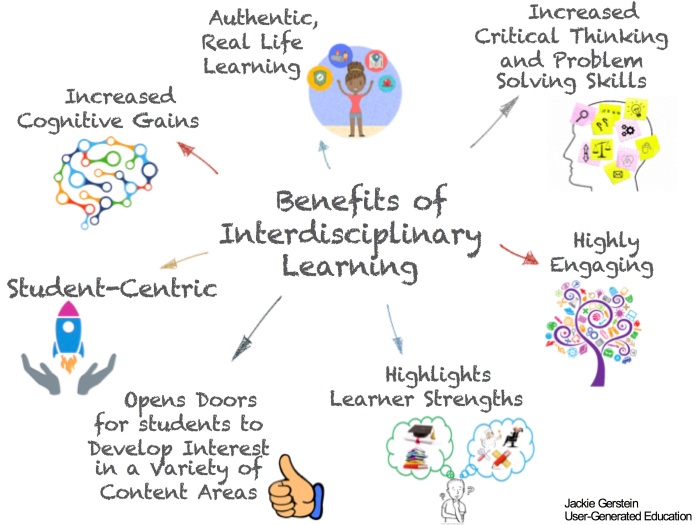All Lessons Should Be Interdisciplinary
I am not a fan of worksheets. In fact, I hate most of them. They don’t teach real world skills. How often does someone do worksheets outside of school? How often when they become adults? They also tend to focus on a single content area concept like specific math problems or questions about a particular text.
I used to teach face-to-face elementary education classes to pre-service teachers. There is evidence that teachers teach the way they were taught. I know that almost everyone has been subjected to worksheets as part of their K-12 (even college) education. It follows, then, that theses new teachers will use worksheets as part of their teaching strategies. I can’t blame them especially if they are not intentionally taught and do not practice other instructional strategies as part of their education.
My instruction with them included a focus on interdisciplinary/cross-curricular, thematic, experiential, and project-based learning. I did very little sage on the stage with them during our classes as I wanted them to directly experience these strategies. They did lots of group discussion, case study analysis, and hands-on activities. I often said to them, “You really don’t have enough time in a day to adequately address all of the individual content areas. It is in both your and your students interest to layer your curriculum with a variety of content area concepts, ideas, and skills that can only occur with more project-based and interdisciplinary lessons. Worksheets won’t do this.”
Multidisciplinary or interdisciplinary learning is a “whole” or “comprehensive” method that covers an idea, topic, or text by integrating multiple knowledge domains. It is a very powerful method of teaching that crosses the boundaries of a discipline or curriculum in order to enhance the scope and depth of learning. Each discipline sheds light on the topic like the facets of a gem.
Imagine being able to teach character development, basic math, and basic science concepts via a classic text. How about basic geography, writing skills, and point of view from that same text? Is it possible to also teach about comprehension, sequence, literal vs. non-literal, imagination, plot, theme, compare and contrast, opinion pieces, vocabulary, friendship, bullying, and critical thinking? The answer is yes, and the genre is legends, myths, and fables (https://www.edutopia.org/blog/a-cornucopia-of-multidisciplinary-teaching-vincent-mastro).
Benefits of Interdisciplinary Learning:
- Obviously, it addresses multiple content areas resulting in increased cognitive development as deeper learning occurs.
- It mimics real life learning rather than isolated educational experiences. It is authentic. When we learn something in the real world, it is interdisciplinary. For example, when learning how to bake or cook something new, one often does research for the best recipes and cooking strategies, reading of recipes and directions, and using math in the actual cooking or baking.
- It helps students increase their critical thinking and problem solving skills. Due to the nature of interdisciplinary learning which often includes the characteristics of deep and project-based learning, students are asked to make their own connections and conclusions about their learning.
- It is student-centric. The focus is on the student rather than on the teacher and on lower levels of Bloom’s taxonomy that often occurs when students are given drill and grill learning activities.
- It tends to be highly engaging for students. They engage because interdisciplinary activities often have at least one content area that is of great interest to the student. It highlights their strengths.
- It opens doors for students to develop interest in content areas in which they have not been typically interested as they see connections between their desirable content areas and other ones.

Some of my blog posts about my interdisciplinary lessons:
- Gingerbread House Making: A Fun and Engaging Cross-Curricular Lesson https://usergeneratededucation.wordpress.com/2018/12/08/gingerbread-house-a-fun-and-engaging-cross-curricular-lesson/
- Day of the Dead (Dia de los Muertos) Displays: A Maker Education Project https://usergeneratededucation.wordpress.com/2018/11/06/day-of-the-dead-dia-de-los-muertos-displays-a-maker-education-project/
- Robot-Enhanced Creative Writing and Storytelling (featuring Ozobot and Wonder’s Dot) https://usergeneratededucation.wordpress.com/2018/05/15/robot-enhanced-creative-writing-and-storytelling-featuring-ozobot-and-wonders-dot/
- Elementary Social Entrepreneurship: A Perfect STEAM Lesson https://usergeneratededucation.wordpress.com/2018/05/13/elementary-social-entrepreneurship-a-perfect-steam-lesson/

Nice post Jackie. More authentic learning is the way to go.
MV Education Services
January 13, 2019 at 4:32 am
This is wonderful, Jackie. I totally agree. The more meaningful we can make learning in school, and the more we can connect it to their lives and interests, the more engaged the students will become. I will investigate some of your other articles via the links.
Norah Colvin
January 13, 2019 at 5:54 am
Yes! Thanks for your comment.
Jackie Gerstein, Ed.D.
January 13, 2019 at 2:50 pm